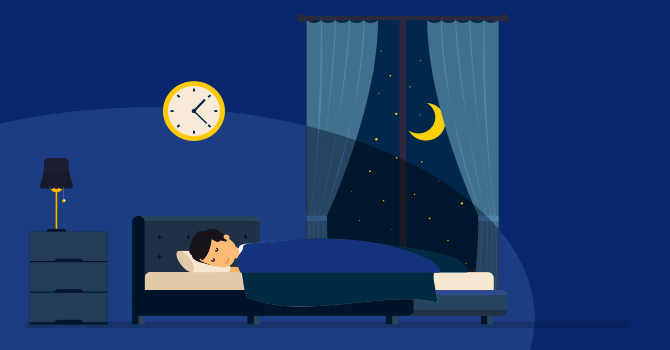
IMG via University of Michigan School of Public Health
With all the distractions in our lives, falling asleep can be difficult. Especially with our phones and other devices stimulating us at all hours, it is easy to derail our natural sleep cycles. While sleeping pills are prescribed carefully in select circumstances, over-the-counter sleep aids like sedating antihistamines (Benadryl) and melatonin are also available (1,2). In particular, melatonin, a hormone that controls the sleep-wake cycle, has grown in popularity. Now, children and adults alike have started to include melatonin gummies in their nighttime routines (3). But should we think twice about the effectiveness of melatonin supplements as sleep aids? Are there any downsides to regular or long-term use? Should we prioritize healthy sleep habits and attention to our mental health?
Melatonin is produced in the pineal gland of the brain and regulates circadian rhythm, or the cycle of alertness and sleepiness resulting from light changes in the environment (4,5). Melatonin production is highest when the environment is dark and decreases as the environment becomes lighter. This means that melatonin production can be hindered if light exposure is too high at night, leading to difficulty falling asleep (6). Melatonin supplements function by regulating patterns of sleepiness, although the exact role of melatonin is not known.
Three systematic reviews with meta-analysis found that melatonin supplements lowered sleep latency (the time it takes to fall asleep) and improved sleep quality better than placebos (7). Additionally, these reviews found that melatonin supplements increased total sleep time (8), and improved sleep quality based on a sleep quality assessment, except in subjects with mental health disorders or neurodegenerative diseases (9).
There are some concerns about potential downsides of long-term melatonin use in children (10). One study of 69 young adults with chronic sleep-onset insomnia during childhood found no differences in sleep quality between people that used melatonin for a mean of 11 years and people that did not use melatonin (11). While this finding may alleviate concerns about the safety of long-term melatonin use, it also questions the efficacy of melatonin since young adults did not experience significantly improved sleep quality in later life related to melatonin use.
While the use of melatonin is associated with some sleep benefits more information is needed regarding the degree of benefit and potential harms. If you’re considering melatonin, it may be wise to attend to healthy sleep habits, such as limiting caffeine intake and avoiding use of electronic devices and blue light prior to sleep, and also prioritize alleviation of any feelings of despair or anxiety.
References:
1. Mayo Clinic Staff. Prescription Sleeping Pills: What’s Right for You? Mayo Clinic. https://www.mayoclinic.org/diseases-conditions/insomnia/in-depth/sleeping-pills/art-20043959
2. Mayo Clinic Staff. Sleep Aids: Understand Options Sold Without a Prescription. Mayo Clinic. https://www.mayoclinic.org/healthy-lifestyle/adult-health/in-depth/sleep-aids/art-20047860
3. Fliesler, Nancy. Melatonin for kids: Is it safe? Is it effective? Boston Children’s Hospital. 13 June 2022. https://answers.childrenshospital.org/melatonin-for-children/
4. Zisapel N. New perspectives on the role of melatonin in human sleep, circadian rhythms and their regulation. Br J Pharmacol. 2018;175(16):3190-3199. doi:10.1111/bph.14116
5. Reddy S, Reddy V, Sharma S. Physiology, Circadian Rhythm. [Updated 2023 May 1]. In: StatPearls [Internet]. Treasure Island (FL): StatPearls Publishing; 2023 Jan-. Available from: https://www.ncbi.nlm.nih.gov/books/NBK519507/
6. Melatonin: What You Need to Know. National Center for Complementary and Integrative Health. https://www.nccih.nih.gov/health/melatonin-what-you-need-to-know
7. Li T, Jiang S, Han M, et al. Exogenous melatonin as a treatment for secondary sleep disorders: A systematic review and meta-analysis. Front Neuroendocrinol. 2019;52:22-28. doi:10.1016/j.yfrne.2018.06.004
8. Chan V, Lo K. Efficacy of dietary supplements on improving sleep quality: a systematic review and meta-analysis. Postgrad Med J. 2022;98(1158):285-293. doi:10.1136/postgradmedj-2020-139319
9. Fatemeh G, Sajjad M, Niloufar R, Neda S, Leila S, Khadijeh M. Effect of melatonin supplementation on sleep quality: a systematic review and meta-analysis of randomized controlled trials. J Neurol. 2022;269(1):205-216. doi:10.1007/s00415-020-10381-w
10. Van de Walle, Gavin. “What does melatonin do, and how does it work?” Healthline. January 13, 2023. https://www.healthline.com/nutrition/melatonin-and-sleep#other-benefits
11. Zwart TC, Smits MG, Egberts TCG, Rademaker CMA, van Geijlswijk IM. Long-Term Melatonin Therapy for Adolescents and Young Adults with Chronic Sleep Onset Insomnia and Late Melatonin Onset: Evaluation of Sleep Quality, Chronotype, and Lifestyle Factors Compared to Age-Related Randomly Selected Population Cohorts. Healthcare (Basel). 2018;6(1):23. Published 2018 Mar 2. doi:10.3390/healthcare6010023
12. https://sph.umich.edu/pursuit/2020posts/why-sleep-is-so-important-to-your-health.html

